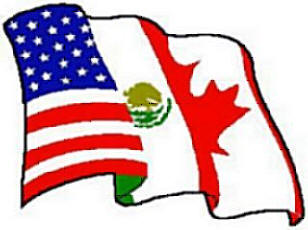Editor’s Note – SUA and MG Vallely have been warning America for years on the ramifications that proposals akin to the European Union would affect our way of life if it were mirrored here. NAFTA is, and has been a stepping stone along this trail, and the now common, open talk of a North American Union is well underway.
In each case, here or in Europe, these efforts are a stepping stone to the New World Order that un-Americans are striving to achieve, including the current administration and many in the beltway, and certainly at the UN.
MG Vallely tells us:
This article from British MP Daniel Hannan (a hero in my estimation) should stand as a stark warning to us in America, against those who want a similar union with Canada and Mexico.
If such a union ever happens here, soon enough we would have all the drug problems and pathologies of our neighbors to the south, and the socialist practices and anti-Second Amendment policies of our neighbors to the north.
NO THANKS! People living in the various nations of Europe now have very little say in anything, their own governments are beholden to the unelected, nameless bureaucrats of the EU in Brussels.
Suicide is NOT a good business plan, nor does it achieve liberty.
The European project is now sustained by coup
By Daniel Hannan
Daniel Hannan is a writer and journalist, and has been Conservative MEP for South East England since 1999. He speaks French and Spanish and loves Europe, but believes that the European Union is making its constituent nations poorer, less democratic and less free.
Even the outward forms of democracy are being shed.
What we have witnessed is a coup d’état: bloodless and genteel, but a coup d’état none the less. In Athens and in Rome, elected prime ministers have been toppled in favour of Eurocrats – respectively a former Vice-President of the European Central Bank and a former European Commissioner. Both countries now have what are called ‘national governments’, though they have been put together for the sole purpose of implementing policies that would be rejected in a general election.
Italy and Greece are satrapies of Brussels, just as surely as Bosnia or Kosovo. In its Balkan protectorates, the EU overtly favours technocracy as the antidote to ‘populism’ (ie, democracy). Left to themselves, the locals have a tendency to vote for parties that want ethnographic frontiers. The EU’s solution is to rule through a series of appointed governors – diplomats (and the odd retired politician) in Bosnia, generals in Kosovo.
Now, like many previous empires, the EU is applying lessons learned through colonial administration to its metropolitan core. Politicians who lean too closely to what their voters want are removed. I don’t mean, of course, that the EU sent in agents provocateurs on a secret mission to destabilise the Italian and Greek regimes. Nor am I suggesting that Brussels was the sole factor in their downfall. Like Margaret Thatcher in 1990, Silvio Berlusconi and George Papandreou already faced strong domestic opposition; in all three cases, the EU simply gave the final shove.
If this sounds like fanciful, read Fraser Nelson in the current Spectator. Fraser reveals the meetings between bankers and federalist leaders who identified the Italian premier as an obstacle to holding the euro together, and quotes oficials boasting that ‘we’re on our way to moving out Berlusconi’. If this is a conspiracy, it’s what HG Wells called an ‘open conspiracy’.
We are watching the culmination of the European scheme. The EU has always been an anti-democratic project. Lacking popular support, rejected in referendum after referendum, it depends on a tight-knit group of functionaries in the Commission and in the member states. Now, in a crisis, the democratic appurtenances and fripperies are discarded. Technocrats in Brussels deal directly with technocrats in Rome and Athens. The people are cut out altogether.
What’s terrifying is that these ‘technocrats’ caused the disaster in the first place. They decided that the survival of the euro mattered more than the prosperity of its constituent members; they presided over the rise in spending and debt; they deliberately overlooked the debt criteria when the euro was launched so as to admit Italy and Greece. Indeed the new Greek prime minister, Lucas Papademos, was running his country’s central bank at the time.
In appointing these two Euro-apparatchiks, our masters are signalling in the clearest possible way that nothing will change. Closer integration matters more to them than freedom, more than prosperity, more than the rule of law, more than representative government itself.

